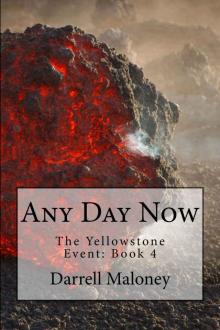- Home
- Darrell Maloney
Eden Bound Page 2
Eden Bound Read online
Page 2
“What? You’re kidding! Why?”
“Something about them breaking in to a secret bunker on the back of the base and chasing out a bunch of people who were hiding inside.”
“That’s ridiculous!” Melissa said. “I know Colonel Medley. He used to come in here when he was a surgeon, before he became the deputy commander. He’s a wonderful man. He’d never do something like mutiny.”
Flash forward four months…
Many things changed.
The sign the sisters made never went up.
Mike Suarez talked them out of it.
“I don’t have much to keep me busy since I had to shut down my solar panel business. Not much call for solar panels these days.
“Let me run the library for awhile. It’ll give me something to do, and I can read my books here just as easily as I can at home.
“And besides, this will give me a place to hold my meetings.”
The sisters relented, handed Mike the keys, gave him hugs and wished him well.
Then they went home and hunkered down for the long haul.
Mike Suarez, it turned out, wasn’t just a social butterfly and an avid reader.
He was also something of a social activist.
In the years before the first freeze it was Mike who convinced the city to tear down vacant houses in his neighborhood that drug addicts were using for trap houses.
He took action to get rid of streetwalkers on the corner of Gillette and Rigsby Roads by hanging out with a camera and shooting video of any prospective customers who stopped to talk to them.
He carried a picket sign in support of local garbage men when they went on strike for better wages and safer working conditions.
In blood red Texas he was branded a “damn liberal” by many, but he wore the label as a badge of honor.
“If wanting to help my neighbors and make the world a better place make me a damn liberal, then I’m all in,” he was fond of saying.
-3-
Mike Suarez took up the cause for the jailed colonels early on.
Like Melissa, he knew Morris Medley personally. They were both active members of the Elks Lodge and volunteered to gather and distribute toys every Christmas for Project Santa.
He knew Morris Medley to be a fine man, and just knew he couldn’t be guilty of the crimes he was charged with.
He’d never met Colonel Tim Wilcox, but knew him by reputation. Wilcox was reputed to be tough, hardcore, and frequently difficult to get along with. At the same time, though, he knew his stuff. He was competent and hard working and, like Medley, was a hell of a surgeon.
Between the two of them, it was said they saved over four hundred wounded soldiers in Desert Storm, then later in Afghanistan field hospitals.
Mike was certain they weren’t the type of men who would mutiny.
And he was determined to fight for their cause.
For weeks Mike and another Mike: Mike Martinez, the San Antonio Chief of Police, had held meetings to plan a blockade around the base.
There wasn’t much they could do to help the colonels, for as civilians they had very little influence on the sprawling military base.
Sure, they went on to the base and visited both men in the brig. They saw the new base commander, who sympathized with them but said he was out of the loop.
“General Mannix is the convening authority. It’s his show and he’s told me in no uncertain terms to stay out of it,” he said.
“Well, how powerful can one general be?” Mike naively asked him.
“When that general is Chief of Staff of the Air Force and Chairman of the Joint Chiefs, he’s at the top of the food chain. The only two people above him are the Secretary of Defense and the President. And neither of them get involved in military justice cases.”
“It may be the military,” Martinez groused. “But this is not justice.”
Since they couldn’t do anything on base to help the colonels, Mike and his band of concerned citizens tried a different tact:
“Maybe if we blockade the base, it’ll bring everything to a standstill.”
“What do you mean,” someone asked, “a blockade?”
“Look around. There are abandoned cars everywhere. Thousands of them. If we used them to form a double ring around the base everything would come to a stop. The base would be an island in the middle of nowhere. Nobody could get in or out. It would disrupt the proceedings and we’d tell General Hardcase we wouldn’t move the cars until he dropped the charges.”
Mike Suarez was a very good man.
And his heart was in the right place.
But he didn’t know beans about the military or how it operates.
The Air Force has things it calls airplanes, which are capable of lifting off at one location and coming back down somewhere else. Those airplanes can carry people, food, or any other type of cargo.
Now granted, Mike’s double ring of cars caused some disruption. People that were on base were kept there for their own safety. People who were off base were furloughed and told to stay at home until the situation was resolved.
But the court martial, if it ever took place, would not have been disrupted at all. The convening authority was already on the base, as was the court martial president and the accused. So were the defense team from the Area Defense Counsel and the prosecution team from the Staff Judge Advocate’s Office.
The courtroom sat idle and waiting in the wing headquarters building.
The only thing missing was the court martial panel, a group of five colonels who were all stationed at Randolph AFB on the other side of San Antonio.
And they could be flown in on one of those airplanes in twenty minutes.
Truth was, the only thing Mike Suarez and his friends did was to get General Mannix’s attention.
Whether that made it easier for him to buckle and give in to Hannah Snyder’s wishes was anyone’s guess. It might have. Or then again, for a hard-headed old goat like Mannix it just as likely angered him and hardened his resolve.
Perhaps it made it harder and took him longer to buckle and drop the charges.
The thing was, only General Mannix knew the answer to that question.
And he wasn’t telling anybody.
Here at the Guerra Public Library Mike Suarez called a meeting of his fellow activists to discuss the blockade; how it was going and what their next moves were.
Fourteen bodies sat in uncomfortable chairs, each one sipping hot coffee and stomping their feet, trying to get their legs to unfreeze and their blood to start circulating again.
A stainless steel flask was being passed around for anyone who wanted to bolster their coffee a bit with a little Jack Daniel’s whisky.
It would be empty before it made the rounds.
Just before Mike called the meeting to order a straggler rushed through the door, breathless and excited.
“I just heard… Mannix dropped the charges and released Colonel Medley. He’s out of jail and on his way home.”
“Are you sure?”
“Yes. The base made an official announcement over ham radio. I heard it myself, about twenty minutes ago.”
One of the men drinking the stronger version of the coffee raised his cup and said, “Here’s to justice.”
One and all shouted, “Hear hear.”
Another made his own toast. “Here’s to the almighty United States Air Force.”
“Hear hear.”
“Here’s to doing the right thing.”
“Hear hear.”
The toasts went on until most in the crowd had empty cups.
Then a soul in the back addressed Mike Suarez directly.
“Now what do we do?”
-4-
Frank Woodard was in a great mood.
For two full days, since they left the city of Lubbock, he’d been driving his modified Humvee at a breakneck speed of three miles an hour.
That wasn’t all the speed the beast could muster, of course. Even using the snowplow bl
ade he’d attached to the front to push a huge pile of snow out of the way, it was capable of moving at a much faster rate.
No, the problem was the visibility.
Not the visibility on the horizon, for there was no fog on this particular day. The sky was overcast with a dirty brown haze, but that was the new normal just a few months after the meteorite strike sent over a million metric tons of dust into the atmosphere.
No, the visibility Frank had had a problem with lately was the visibility of the highway markers.
In the State of Texas a yellow reflective marker is placed every two hundred feet just off the shoulder of the highway.
They’re not put there just to be pretty. That would be stupid, and the State of Texas rarely does anything stupid.
Actually it does, but shhh… don’t tell anybody.
In the case of the yellow reflectors, they’re placed there so that when the weather is bad or the fog is thick, drivers can use the reflectors as tools to tell them they’re still on the road.
As long as the driver can see the reflectors and they’re fifteen feet or so to their right, they’re still on the roadway.
If the reflectors are on the driver’s left, however, that means there’s a problem.
The reflectors are set exactly thirty six inches off the ground.
And since Frank left Lubbock with Josie and Eddie, they’d been covered with snow.
As they got closer and closer to Big Spring, though, Frank’s luck had changed just a bit.
That’s why he was as happy as a clam.
“What on earth are you grinning about?” Josie asked from the passenger seat.
“Look. Out there. Tell me what you see.”
“White. Lots of it.”
“Look closer.”
“Frank, I see snow. A boatload of snow. Just like I saw yesterday and the day before that and the day before that.”
“No, honey. Look clo…”
“Don’t piss me off, Frank. Don’t make me remind you why I’m the boss of us.”
Eddie, in the back seat, smiled and chided, “Ooh, Mister Frank… Josie said she’s your boss…”
Frank took a step back, then took a deep breath and started to explain.
“I can finally see the tops of the reflector poles peeking out of the snow.”
She looked out the window and, as he requested from the beginning, looked closely.
About fifteen feet to their right she was barely able to make out a piece of metal sticking perhaps half an inch above the top of the snow.
“Is that it? That’s all you see? That’s not a reflector.”
“No, that’s the top of the post. The reflector is about an inch below the top. I don’t have to see the reflector itself to see the post. Seeing the post is just as good.”
Eddie asked, “Is the snow melting, Mister Frank?”
“No, Eddie. Apparently the last snowstorm wasn’t as intense here as it was farther north. It looks like the snow pack is receding a bit.”
“Is that good? Receding, I mean. Is receding a good thing or a bad thing?”
“It’s a good thing, Eddie. A very good thing. I just hope it stays that way. It’s entirely possible it gets bad again later on. Weather systems and storms aren’t exactly uniform in consistency. I think…”
“What does that mean, Mister Frank? I don’t understand.”
Frank simplified his answer for Eddie’s benefit. Eddie had a severely damaged brain. One which had lost the ability to reason. The ability to calculate and problem solve. He had a hard time wrapping his brain around things others thought simple.
“It means, Eddie, that we no longer have to drive on the bumps to feel our way along. Now I can see the markers and know where the road is. Just cross your fingers that doesn’t change.”
“Okay, deal. I’ll cross them right now!”
Josie smiled.
Eddie was a fully grown man. But in many ways he was a small child.
And when the child side of him was more evident than the man side he could be very endearing.
It helped make up for other times, when dealing with him was an exercise in frustration.
“Does this mean you can speed up a bit, honey?”
The new question came from Josie. Eddie didn’t call Frank “honey.”
It would have been weird.
“I already have.” Frank looked down at his speedometer. “I’m going six miles an hour now. I’m practically flying.”
The fact that Josie hadn’t detected the increase in speed wasn’t surprising.
After all, going from three miles an hour to six isn’t a significant amount.
It’s roughly equivalent to a snail shifting his walking speed from first gear into second.
Still, Frank was a happy man.
Sadly, Frank didn’t know he had a much bigger problem than the packed snow and its tendency to bury the highway reflectors.
Their speed in navigating the highway was relatively minor in comparison.
The only thing their speed impacted was their travel time. And as long as they kept moving forward they were making progress.
Whether it took three days to get to Salt Mountain or thirty days didn’t matter much in the grand scheme of things.
Now this other problem… that was much worse.
That was a problem which just might kill them all.
-5-
In the black pickup truck slowly following behind Frank’s Hummer, Johnny Connolly’s mood didn’t match Frank’s at all.
He’d noticed the increase in speed. It wasn’t much, but now they’d get to Big Spring a bit faster.
He should have been pleased.
But he was a creep and a jerk of the highest order.
That’s what Tina’s best friend tried to tell her when she first got mixed up with Johnny.
She should have listened, but she didn’t. Later she’d admit to herself her friend was absolutely right. But by then it was too late. By then she’d let herself fall in love with him.
Good girls all too frequently fall for bad boys because they’re the only ones who can see their good qualities.
Or so they believe.
Often they’re just fooling themselves. They see qualities which aren’t there, but which they wish to be. They think they can change them. They think they can straighten them out.
By the time they realize it’ll never happen, that their man is rotten to the core and can’t be rehabilitated it’s too late. They’re stuck with him.
And that’s good, because nobody else wants him.
They always stay with him far too long, the girls do, out of a sense of pride or stubbornness.
Or because they don’t want their friends or family to be able to say, “I told you so.”
Some scummy men exasperate the problem by convincing the women nobody else will want them. They turn the tables on them, saying, “You’re not as pretty as you once were. You weigh more than you used to. You’ve really let yourself go. If you kick me out you’ll be all alone.”
Sadly, some women buy into that and stay with the sleazebag much longer than they should.
It’s not until they finally kick the fool to the curb they find out they could have done much better without him, even if much better means being alone for awhile.
There’s an old adage that says men marry women hoping they’ll never change, that she’ll stay exactly the way she was on the day they met. Women marry men thinking, “He’s far from perfect, but I can change him.”
It’s true, not in all cases, but in a surprising percentage of them.
That’s the way it was with Johnny Connolly and his girlfriend Tina.
He was a convicted felon when they met, and a successful drug dealer who stole from everyone he knew. And often from people he didn’t know. He was a user, both of drugs and of people.
Tina was mostly a good girl with a drug habit, and hooked up with Johnny as a means of getting free dope. The good girl inside of her, th
ough, longed to give up the lifestyle and to reform her man into a respectable citizen someday.
His goal was to keep her exactly the way he found her: a pretty girl junkie who gave him comfort and companionship and asked little of him other than her daily fix.
On this particular day, following Frank’s Hummer down a Texas highway at a whopping six miles an hour, they were having a lover’s spat.
“Johnny, I don’t know if I can stay with you if you kill those people. I mean, what have they done to you? They’ve been kind and let us follow them all the way to Big Spring.”
“Yeah, right. They kinda have no choice. What are they gonna do, shoot out our tires for following them?”
“Johnny, they gave us some of their MREs to eat.”
“So what? They probably stole them off of somebody else.”
“I don’t think so. They don’t seem to be the type.”
“Type? Type? What in hell do you know about them? An old man and his daughter, and some idiot in the back seat who doesn’t have a clue what’s going on in the world around him. How in hell do you think you know anything about them?
“As for you leaving me, good luck with that. When’s the last time you combed your hair or took a shower?”
“Three days ago, just like you. It’s kind of hard to take a shower and do my hair when we’re stuck on a road out in the middle of nowhere.”
“That’s not my point, Tina. My point is that you look like hell.
“The girl I fell in love with was pretty as hell. She wore makeup and did her hair and wore nice clothes. She was smokin’ hot. I was proud to take her out in public and show her off. I thought it was cool the way other guys looked at her and I felt like the king of the world, because they couldn’t have her. She was mine, all mine.
“Look at you now. When’s the last time you wore makeup? Six months ago? A year? You’ve worn those same dirty jeans four, five days in a row now. I don’t think your hair has seen a brush in years.”
“That’s not true, Johnny. I bru…”
“Shut up, I’m not finished. Why are you always interrupting me when I have something to say? Is that because it hits a nerve because you know I’m right?

 A Perilous Journey
A Perilous Journey The Yellowstone Event: Book 6: The Aftermath
The Yellowstone Event: Book 6: The Aftermath Eden Bound
Eden Bound Without Warning
Without Warning Everything Has Changed
Everything Has Changed Rest in Peace
Rest in Peace This Changes Everything
This Changes Everything The Final Chapter
The Final Chapter It Can't Be Her
It Can't Be Her A Troubling Turn of Events
A Troubling Turn of Events The Blockade
The Blockade A Tearful Reunion
A Tearful Reunion Countdown to Armageddon
Countdown to Armageddon Alone, Book 3: The Journey
Alone, Book 3: The Journey The Army Comes Calling
The Army Comes Calling The Grim Reaper Comes Calling
The Grim Reaper Comes Calling Her Name is Beth: Alone: Book 5
Her Name is Beth: Alone: Book 5 Red: The Adventure Begins
Red: The Adventure Begins Rise From The Ashes: The Rebirth of San Antonio (Countdown to Armageddon Book 3)
Rise From The Ashes: The Rebirth of San Antonio (Countdown to Armageddon Book 3) An Unkind Winter (Alone Book 2)
An Unkind Winter (Alone Book 2) A Stunning Betrayal: Alone: Book 9
A Stunning Betrayal: Alone: Book 9 A Whole New World: Ranger: Book 2
A Whole New World: Ranger: Book 2 Return To Ely
Return To Ely A Lesson Learned: Red: Book 3
A Lesson Learned: Red: Book 3 The Homecoming: Countdown to Armageddon: Book 5
The Homecoming: Countdown to Armageddon: Book 5 Final Dawn: Book 12: Where Could He Be?
Final Dawn: Book 12: Where Could He Be? An Acquired Taste
An Acquired Taste On Desert Sands: Alone: Book 6
On Desert Sands: Alone: Book 6 The Battle: Alone: Book 4
The Battle: Alone: Book 4 Any Day Now
Any Day Now Too Tough To Tame: Red: Book 2
Too Tough To Tame: Red: Book 2 No Help From Austin: Red: Book 5
No Help From Austin: Red: Book 5 An Unwelcome Homecoming
An Unwelcome Homecoming A New Start: Final Dawn: Book 9 (Volume 9)
A New Start: Final Dawn: Book 9 (Volume 9) A Stunning Betrayal
A Stunning Betrayal An Undeclared War (Countdown to Armageddon Book 4)
An Undeclared War (Countdown to Armageddon Book 4) One of Our Own: Final Dawn: Book 11
One of Our Own: Final Dawn: Book 11 Texas Bound: Alone: Book 11
Texas Bound: Alone: Book 11 Payback: Alone: Book 7
Payback: Alone: Book 7 The Quest: Countdown to Armageddon: Book 6
The Quest: Countdown to Armageddon: Book 6 The Siege
The Siege The Yellowstone Event: Book 1: Fire in the Sky
The Yellowstone Event: Book 1: Fire in the Sky Return to Blanco (Red Book 4)
Return to Blanco (Red Book 4) The Search
The Search AFTER THE DUST SETTLED (Countdown to Armageddon Book 2)
AFTER THE DUST SETTLED (Countdown to Armageddon Book 2) Death Comes Calling (Ranger Book 3)
Death Comes Calling (Ranger Book 3) A Long Road Back: Final Dawn: Book 8
A Long Road Back: Final Dawn: Book 8